August auto sales provided the strongest signal of an economic rebound that we’ve seen yet. But August is so yesterday.
In terms of U.S. sales of cars manufactured in North America, this was the best August since 2006.
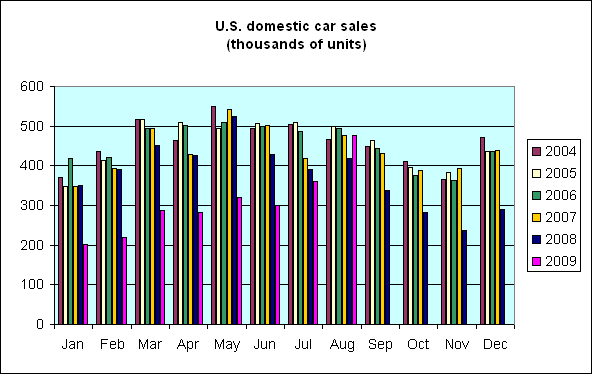 |
Sales of light trucks (which includes the SUV category) were less impressive– up 17% from July, but down 18% from August 2008.
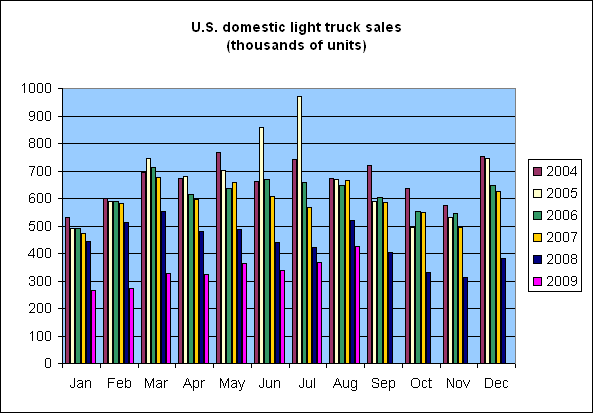 |
But imported light trucks were another story, up 39% from July and up 14% from August 2008.
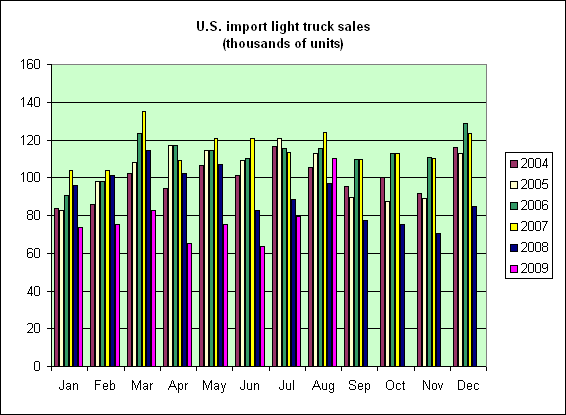 |
And imported cars saw their best August since I’ve been collecting these data.
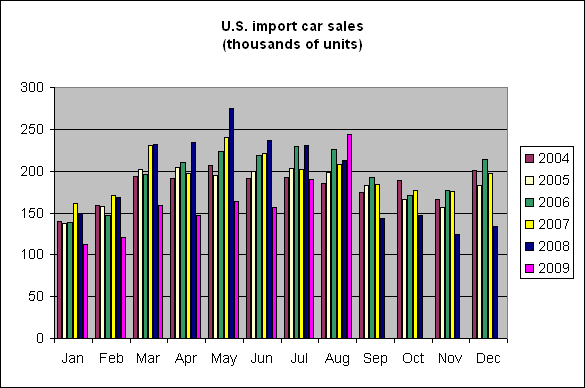 |
“But the real question,” notes Jesse Toprak, vice president for TrueCar.com, “is what will happen when this adrenaline shot [from Cash for Clunkers] wears off in September?”
An earlier report from MarketWatch had this sobering answer from Edmunds.com Senior Analyst David Tompkins: current purchase intent is down 50 percent from the Cash for Clunkers peak, and down 11 percent from the June average.
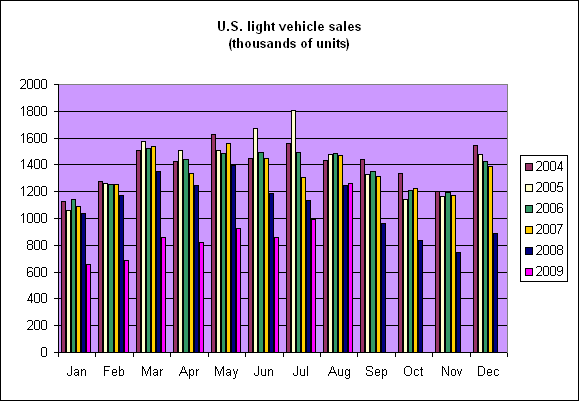 |
It’d be nice to see the domestic and imports combined for total sales. It’s also be nice to start seeing scrap rates, especially if they can be broken down by model year.
It never ceases to amaze me that politicians think they can have a meaningful effect the economy with these silly temporary programs. And it is a non-partisan issue, both sides are equally ignorant.
About a million useful, cheap cars, and their salvageable engines, transmissions, body parts were destroyed, making working class individuals poorer.
No different than the urban renewal schemes of tearing down millions of paid, afforded housing units for 1/10 the number of union build, high cost, unwanted public housing slums.
The same Marketwatch report that said said Sept sales would be down 11% from the June level also estimated that August sales would be some 16 million, not the 14 M actually reported.
No one can forecast monthly car sales that well.
Yes, some of the cash for clunkers sales borrowed sales from the future. But they could just as well be sales borrowed from 2010 or 2011 as from Sept. or Oct 2009.
The terms of the cash for clunker deals probably meant that it attracted a large number of individuals who had not been planing on trading cars immediately.
Perhaps this is wishful thinking, but I don’t think sales will drop as much as some suspect. Some new car shoppers without a clunker to trade in probably put off their purchase until after after the artificial demand from C4C subsided. So there is probably some pent up demand.
These data also suggest the C4C program caused people to buy more fuel efficient cars than they would have otherwise.
The government is attemting to change sentiment by targeted cash give-aways, but they cannot change fundamentals by simply rearranging the chairs on the Titanic. Cash for clunkers is gone. Soon the $8,000 home purchase credit will be gone.
Granted there are still billions to be given away in 2010, but give-aways will never replace the more necessary projects that the government quashed by confiscating the money for political purposes. The give-aways in 2010 will have the same effect – at most a flash in the pan. Tax revenue that takes resources away from free market projects and gives them to projects for political gain always introduce friction into the economy.
Who knows when dealers will sell a car again, after the clunker deal. They may even get their money owed by the Feds before their next sale. Most of the cars sold were foreign and Chrysler ran out of cars to sell. Another government sponsored fiasco at taxpayer expense.
Aaron: I’ve added this last graph as you requested.
Thanks Dr. Seperating cars and trucks would be good too. But I can do it myself.
Mike, I’m sure you’re right, but the effect won’t be significant. Many people would expect prices to fall after the program (dealers would raise or delay lowering prices in anticipation of the credit). But the number would be very small and we should have seen a dip in sales when we started talking about the plan. Numbers should head back to where they were before any dip. Since there was no dip that I’m aware of, any bump we saw during the program should show up as a future dip.
I think the “free market” policies of 2004 pulled demand from 2009.
Just look at that chart.
We have to keep in mind that Cash for Clunkers was “only” a $3 billion program, so it’s unlikely that it would be a silver bullet that fixes all that ails the US economy.
But I’ll state the reason that I liked it, all things considered. They collected data on the program and found that the average clunker traded in had 15mpg, and the average new car purchased averaged 25mpg.
So we got a 10mpg increase in fuel efficiency on a sizable number of vehicles. Imported oil is one of the many things that ails us. Not to mention we get a similar decrease in CO2, and if we are going to attempt doing something about global warming, I much prefer explicit plans to reduce CO2, rather than dubious approaches like cap and trade(who was it that decided Wall Street was intelligent all of a sudden?) or the other one that bothers me…tax CO2 out of existence.
Pull demand forward, never tell anybody what the true price of today’s happy numbers will be.
That has been the whole US strategy toward banks, AIG, agencies… everything. C for C can now be a template; it can show what we might expect from all the other redistributions.
James,
Can you do a follow up to the Dueker article from December?
https://econbrowser.com/archives/2008/12/predicting_the_1.html
His forecasts turned out to be quite accurate, and deserves mention. If he can provide his latest forecasts, that would be an interesting angle to the follow up.
“So we got a 10mpg increase in fuel efficiency on a sizable number of vehicles. Imported oil is one of the many things that ails us. Not to mention we get a similar decrease in CO2, and if we are going to attempt doing something about global warming”
In the most optimistic of scenarios, as far as I have read, the fuel savings amounts to 0.2% of annual consumption, while the carbon savings is well under 1% — and that is _before_ the emissions are figured in for the transportation, destruction and disposal of the old cars, and for the production of the new vehicles. Particularly if the $3 billion surface cost turns out to be dramatically higher through unintended (or some would argue intended) spillover effects, these aren’t exactly admirable efficiencies.
Adam – neat point. It will probably be even clearer when we have a longer data stream for the period after the adjustment to over borrowing.
Cedric R: 25 miles per gallon (by official rating) is still quite poor. 15 MPG is unbelievably poor – what were these people driving? I recall in ’96 about the very worst you could do was the Toyota Land Cruiser at 12 MPG. Look at sales of light trucks today. In my old neighborhood, all the parents bought their teenagers light trucks for their safety. (And of course, all the ‘soccer moms’ drove same.) Talk about an arms war on the highways. We really need to tax gasoline consumption.
PM
Haven’t seen any studies like that, but we did get about 750,000 vehicles to get 10 mpg more than before. And they needed to be scraped anyway, so that part is a wash.
So I’m willing to give it one cheer for a small victory. And it did only cost 3 billion. Pretty cheap as far as government programs go.
Don,
They were driving clunkers! Plus mileage had to be worse than 18mpg to qualify for the program.
I too think safety and the civilian arms race had a lot to do with SUV and light truck popularity. I was pretty sure we would get a civilian version of the M1 to complement our Hummer fleet.
But I hate taxes. The new CAFE is the way to go. We make consumers pay more for better mileage cars. Tax money never gets applied to a solution. If the government levels the playing field the new technology will become available and consumers all will have to buy it. CAFE increases mileage by 30% by 2017. 50% of our oil use is transportation fuel. That is a 15% overall reduction due to improvement in efficiency. CO2 also. “Efficiency” is to an engineer as “productivity” is to an economist. It’s the magic that makes wonderful things happen.
We probably need to do more than this to reduce oil dependence and CO2, but this is a significant first step. If we can further improve battery technology and get 3rd gen nuclear power plants built, then we can shift more towards electric cars.
T Boone Pickens wants to convert all trucker big rigs to natural gas, which is very feasible now and makes a lot of sense. That drops CO2 by about 20% and natural gas is looking pretty plentiful locally.
Cedric,
You’re forgetting that the cars traded in weren’t used nearly as much the new cars will be. They were mostly 2nd or third cars that were barely used and not far from being sold or donated. Or they were driven by teenagers who will be allowed to drive a different cars, i.e. the clunker turned in is not the actual car being replaced.
Beyond that, we’re ignoring the production costs in material exctraction, manufacture, and assembly.
Then we’re ignoring the economic activity and growth that will no longer take place because there are fewer cars availible in the less than $4500 after this.
Then you have increaced pollution because these car are no longer exported to developing countries to replace worse polluters.
But hey, it might save some fuel by getting some of the worst drivers off the road and decreasing congestion.
Fixed cost items such as a car factory, a union contract or a car platform design have very long lives. These fixed costs can not be changed in a manner of months.
In this regard, car sales are still down from what the industry had planned on supporting. We still have factories and workers which are being idled and will never produce another car.
As for scrap rates, who cares? How many cars do Americans needs? Now that families have one wage earner instead of two, how many cars do they need. Instead of buying a new car ever 3 – 5 years, what if we keep the car for 10? I drive a 1995. Been to your local mechanic lately? Perhaps the only industry that is doing well is auto repair.
Cedric,
Oil imports are not because of the average MPH of our cars. Oil imports are because we are prevented from producing oil. Now this is neither good nor bad really because if we can get oil imported at a lower cost than we can produce ourselves we can use the excess resources to produce other produces.
Lower MPH is a red herring concerning oil imports. MPH has nothing to do with importing oil.
DickF
I realize we could pump more, but deep water cost is about $45, so selling price needs to be around $60. So even if we did reverse policy, which I think may be bad, because why not save some oil for later, then it is still expensive oil. Of course import oil is expensive too. It just has higher profit margins, which go to countries with factions that are not exactly friendly with the US. Then whether you believe global warming or not, which personally I have some doubts about, the fact remains that world governments may decide to do something about it.
So better efficiency does help all these things. Waste has hardly ever been a good thing.
And if cars do get more expensive, and we maintain some developed world standard for what can be driven on the road, then maybe that will help fill up all those empty city buses I’ve been paying for. It is very possible that everyone may not be able to afford a car.
Better efficiency also lowers operating costs, acting as real economic stimulus. I think the CBO study on gas tax vs. CAFE is flawed. I think they’re right that they are both economic losers, but the advantage of a gas tax is greatly exaggerated. I expect they are about the same.
Gas tax has the advantage that car prices don’t go up right away, keeping cars cheaper earlier and reducing the burden of capital investment. CAFE increases the barriers to entry in the car ownership market, but reduces operating cost and operating risk acting as economic stimulus. A gas tax increases operating costs, decreasing economic activity and increasing operating risk, but it gets the (supposedly) least valuable driving off the road relieving congestion. It also has the advantage of taking poorer drivers off the road, who tend to be more dangerous, are less experienced, and drive big old cars; I’m guessing they tend to add a lot to congestion by driving too slowly when it matters and too fast when it’s not safe or useful.
Despite the CBO, I think it’s far from clear which is better. Especially in this environment. Assuming we must do one or the other, right now I lean towards CAFE. However, I think doing nothing is better and I definitely think Obama over did it.
About a million useful, cheap cars, and their salvageable engines, transmissions, body parts were destroyed, making working class individuals poorer.
Only the engine and drivetrain were destroyed. The dealer could salvage the rest as parts for other people driving that kind of car.
I don’t think we destroyed that much value with CARS; there’s a good argument that we consumers had built up our auto inventory too much. And poor people still have a lot of old used cars available to them. Go check Craigslist for your town.
I’m more doubtful of the environmental benefit, although I could still see it being a net positive, and maybe even cost-effective its gains.
aaron
The additional up front cost is not really that bad. The near term technologies that manufacturers will use to meet CAFE, other than the obvious one…start making cars again instead of behemoths, are as follows:
1) Hybrid – Toyota says it adds $3000 cost now and they plan to reduce that to $1500 in a few years.They do mean “cost”, so take that up for selling price. I think they probably divide cost by .75 to .7.
2)Plug-in hybrid cost would be similar, and you need a $1500 charger for the garage. Also a utility with a good grid and surplus capacity. And for the long term 3rd gen nuclear can halve what we pay now for electricity. China has licensed the Westinghouse design, and built a huge R&D facility to assimilate the technology, train workers, set up modular standardized manufacture of major components, and have broken ground on some construction sites. The CBO accountants don’t know everything.
3)Lean burn IC. Manufacturers say this is ready for production. It can take MPG up 20% and costs about $1500 which basically is the cost of a fancy fuel injector, sensors and electronic control. Bosch is one supplier.
4) Clean diesel – About 30% more efficient than gasoline. Haven’t seen costs, but I suspect it may be a little less than hybrid.
5) Honda sells a lot of natural gas cars elsewhere in the world. I’m not sure about the safety issue of the fuel tank.
Then there are all electric cars, but for these to become mainstream we need better/cheaper batteries and more cheap electric capacity. 3rd gen nuclear is the only thing that would be practical. 123 Systems and China’s BYD(Warren Buffet recently bought a piece of them)have some new battery chemistry that seems to be a major improvement.
Great discussion on this topic guys.
All those who think C4C and first home buyers incentives are a big waste of time are ignoring “sentiment”.
It is “sentiment” that things are getting better that makes people willing to take more risk and start spending. It is this that will re-ignite the economy.
You can laugh about Government intervention but as far as I am concerned it has been proven as being HIGHLY effective.
Look at what the FED’s have done – near market melt down and talk of “Great Depression” and thankfully – through their efforts – we see optimisim returning.
I am not thankful for corruption and lack of oversight at many levels of Western Government and silly Greenspan policies that got us into this mess (the Madhoff SEC non-investigation story is astonishing!). I am also not thankful that Fat Cat Banker’s get their cake and can eat it too (when many of them shoudl probably be in jail)! However, I am very thankful Bernanke and the FED’s have avoided another Great Depression!
AMEN
But anony, wasn’t Bernanke part of that Fed crafting those “silly Greenspan policies”?
Didn’t Greenspan actually cowrite a report with Kennedy about the rampant MEW that Bernanke ignored along with any thought that there might be a housing market bubble?
It is early with the “HIGHLY effective” praise of government intervention. And naive. Examine GM’s previous client record and compare the new buyers.
We are so screwed.
By far the simplest option for fuel economy for the US is to change to diesel.
In the states I drove a Prius for three years and drove ~40,000 miles in that time. I was driving almost entirely on the highway and got ~48 mpg over the lifetime of driving the vehicle. (Actual)
I now live in Ireland. I drive a 2 litre diesel Audi A3 that feels like a sports car compared to the Prius, costs a bit less, and gets ~40-45mpg. (Actual). I’ve also only driven 8,000 miles in two years.
Colleagues at work drive a range of cars, most of them diesel, and low mileage is mid-thirties. Reports of high-forties (actual) are common.
Switching to diesel would require new refineries and buying oil from different sources. It pollutes more and would drive up costs construction, argiculture, shipping, and industry.
We can shift toward more diesel, but switching isn’t really possible. Fuel out is a function of what goes in and a little bit of refinery design. Some tweaking can also be done with cracking etc.
Diesel has always been popular in Europe due to inherent 30%-35% higher efficiency over gasoline.
Pollution was a problem in the past. A consequence of diesel combustion is high particulates and high NOX, which has 300X the global warming effect of CO2. Then cheap diesel fuel tends to be high sulfur content.
Clean diesel has changed all this. Ultra-low sulfur diesel is now mandated, and there are particulate traps and NOX catalytic converters in new clean diesel cars.
Problem is existing refineries can change the gasoline vs diesel mix somewhat, but not much. I also asked a Exxon ChemE if a new refinery could be built that only made diesel. He didn’t think so, you get both gasoline plus diesel in the cracking process.
So no silver bullets with energy, just silver buckshot. We need a mix of lots of things.
“Only the engine and drivetrain were destroyed. The dealer could salvage the rest” for electric drivetrain conversions.
http://www.diyelectriccar.com/
http://evhelp.com/
These are the skills that vehicle dealers will need to compete in this century.